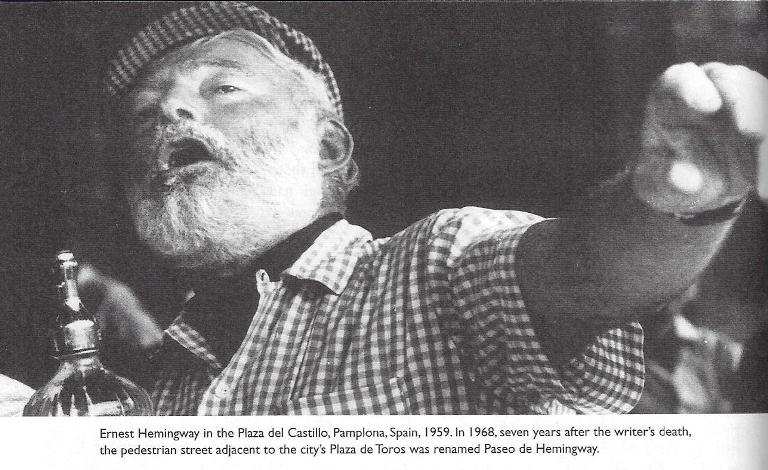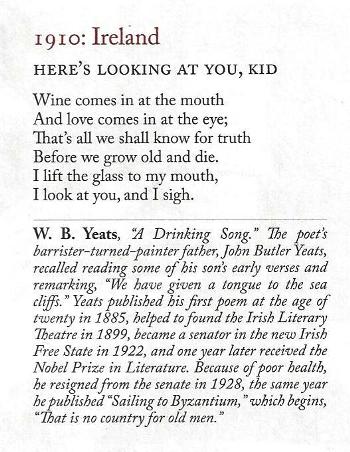|

|
Lapham's Winter
2013: Intoxication
Ghiền
Bondage
In
1975, at the age of twenty-three, Ian
Fleming’s only child, heir to the Bond millions, ended his life with a
deliberate overdose.
Vào năm 1975,
đứa con trai độc nhất của Ian Fleming, kẻ thừa kế gia tài hàng triệu
triệu, của
kẻ sinh ra nhân vật giả tưởng Bond, chấm dứt đời mình bằng một liều ken quá liều
Ghiền
MISCELLANY
Primo Levi
wrote that at Auschwitz "a large amount of
alcohol was put at the disposal of" members of
the Special Squad, inmates of the concentration
camp who were forced to work the
crematoriums, "and that they were in a permanent
state of complete debasement and
prostration."
One such inmate said, "Doing this work, one
either goes crazy the first day or gets accustomed
to it."
Primo Levi
viết, ở Auschwitz, “rượu ê hề dành cho” Biệt Đội, những tên tù bị bắt
làm cái
việc đẩy xác người vô những lò thiêu, “những tên tù luôn trong tình
trạng hoàn
toàn bại hoại”. Một đấng “đặc nhiệm” phán, “Làm việc đó, thì, hoặc
khùng ngay
ngày đầu, hoặc quen đi”
On November
22, 1963, Aldous Huxley, bedridden and
dying, requested on a writing tablet that his wife
Laura give him a 100 microgram dose of LSD.
As she went to get the drug from the medicine
cabinet, Laura was perplexed to see the
doctor and nurses watching TV. She gave him a
second dose a few hours later, and by 5:20 P.M.
he had died. Laura later learned that the TV
had been showing coverage of the
assassination
of John F. Kennedy, who had been pronounced
dead at 1:00 P.M. that day.
Vào ngày 22
Tháng 11, năm 1963, Aldous Huxley, hấp hối nằm trên giường,
nguệch ngoạc vài dòng, ra lệnh cho bà xã chạy đi kiếm 100
microgram LSD [thuốc gây ảo giác]. Bà vô chạy tới tiệm thuốc tây, thì
thấy mấy
tướng bác sĩ, y tá đang dán mắt vào cái màn hình TV. Phải cú đúp, thì
ông chồng mới thanh thản lên chuyến tầu suốt, và
đó là vào
lúc 5:20 chiều. Sau đó, bà vợ được biết TV bữa đó chiếu cảnh sát thủ
làm thịt Kennedy, và Người lên tầu vào lúc 1:00 cùng ngày, sớm hơn ông
chồng của bà mấy tiếng.
"Bomb
the shit out of them!" was reportedly a drunken
President Richard Nixon's conclusion as to what
should be done about Cambodia.
Henry
Kissinger recalled in an interview in 1999 that
"two glasses of wine were quite enough to make him
boisterous,just one more to grow
bellicose or
sentimental with slurred speech."
“Dội bom cho
chúng phọt kít ra cho ta”, tông tông Mẽo Nixon, xỉn, ra lệnh cho tà lọt
Kissinger, về điều phải làm với xứ Cambodia.
Chỉ cần hai ly rượu chát là Người sảng!
Gấu Cà chớn có cả 1 kho
giai thoại & kỷ niệm về Ghiền, về thành phố Sài
Gòn và cái thế giới Ghiền của nó. Thì cũng sắp - sắp khỉ gì nữa - đi xa
rồi,
giữ làm khỉ gì nữa.
Thủng thẳng phun ra hết, hà hà!
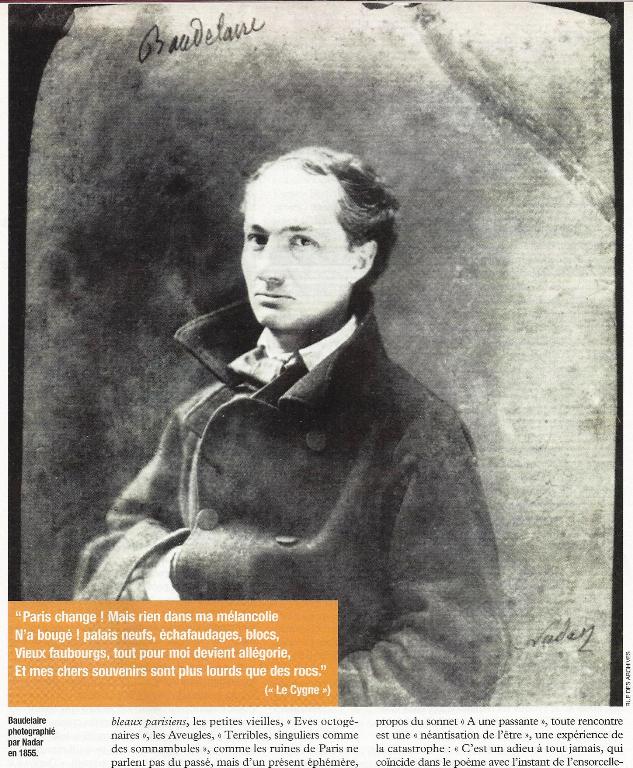
Hình: Le
Magazine Littéraire, số đặc biệt về
Baudelaire, Mars, 2003
Này,
nhìn
này, bé
Rượu đỏ thì vô bằng miệng
Yêu, bằng mắt
Đó là tất cả chúng ta sẽ biết về sự thực ở đời
Trước khi chúng ta trở nên già và chết
Ta cầm ly rượu lên miệng
Nhìn bé, và thở dài đánh sượt 1 phát
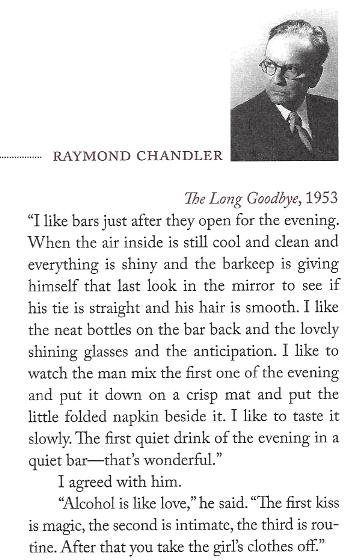
"Tôi
thích quán nhậu khi họ mở cửa cho cữ chiều. Khi không khí bên trong
quán còn
mát, và sạch và mọi thứ thì sáng long lanh, và tay giữ quán tự ban cho
mình 1
cái nhìn chót, khi nhìn vô gương, để coi xem cái cà vạt của anh ta có
OK hay là
không, và tóc tai mượt mà ra làm sao. Tôi thích những chai rượu xếp
ngăn nắp
phía sau quầy rượu và những cái ly sáng choang đáng yêu biết là chừng
nào và
cái sự ‘dzô, dzô, một trăm em ơi, chiều nay một trăm phần trăm’, của
chúng. Tôi
thích nhìn tay làm rượu trộn ly đầu tiên của buổi chiều, để nó xuống
miếng vải
lót ly, và để 1 cái khăn lau miệng nho nhỏ, được gấp lại ở kế bên. Tôi
thích nếm
ly rượu chầm chậm. Cú uống trầm lắng của buổi chiều trong 1 cái quán
trầm lặng
- ôi chao, tuyệt cú mèo làm sao!"
Tôi đồng ý với anh ta.
“Rượu thì giống như tình yêu," anh ta nói. “Cái hôn đầu thì mới huyền
diệu
làm sao, cái thứ nhì, ‘mình vào đời nhau’, cái thứ ba, ‘đến hẹn lại
lên’. Sau
đó, bạn lột trần truồng em ra và phán 1 phát”. (1)
(1)
Mấy bữa nay
bác viết hay ghê – hết viết tục rồi.
Cám ơn nhiều.
Tks. NQT
Anh Nguyễn
tuyệt quá, càng già càng dẻo càng dai - Hổng khác gì con trai!!. Cầu
chúc anh mạnh
khỏe nhiều nhiều để còn cho ra những bài thật tuyệt.
Tks. NQT
Không viết tục,
nhạt miệng lắm. Bọ Lập trần tình với độc giả. Với riêng Gấu, nó là thứ
“chim mồi”,
ở những người quá đát. Cái bài viết Nước
Mắm Lá Chuối tình cờ kiếm lại được,
hóa ra là viết dở, rồi bỏ ngang, đến cái tít cũng chưa giải thích được,
và nó –
cái tít - là 1 hình ảnh tuyệt vời, giống như những hình ảnh tuyệt vời
của 1 miền
đất, như những “cá rô cây, cá gỗ”... Khi bỏ vô Nam, Gấu giữ cho riêng
mình 1
số kỷ niệm, hình ảnh, của cái làng Bắc Kít của Gấu, trong đó có "Nước
Mắm
Lá Chuối".
Re: Mấy bữa
nay.
Quả là khủng thật, khách
viếng thăm nườm nượp, như đi đền Thánh Trần
cầu Phúc,
thứ thiệt, không phải thứ này:
Bây giờ, lúc rạp mình trước đức Phật là lúc tâm chúng sinh bất an nhất.
Cô Tư: Sốt Ruột Tháng Giêng
| 18 Feb 2013 |
399 |
623 |
2,345 |
161.98 MB |
| 19 Feb 2013 |
521 |
1,128 |
3,140 |
201.28 MB |
| 20 Feb 2013 |
495 |
1,368 |
3,263 |
182.71 MB |
| 21 Feb 2013 |
264 |
650 |
2,228 |
170.28 MB |
| 22 Feb 2013 |
206 |
364 |
1,816 |
127.31 MB |
| 23 Feb 2013 |
518 |
2,101 |
4,173 |
203.98 MB |
| 24 Feb 2013 |
480 |
2,185 |
4,347 |
197.63 MB |
| 25 Feb 2013 |
434 |
2,263 |
4,545 |
223.87 MB |
| 26 Feb 2013 |
508 |
1,540 |
4,588 |
274.24 MB |
| 27 Feb 2013 |
564 |
3,374 |
5,709 |
306.93 MB |
| 28 Feb 2013 |
236 |
385 |
1,256 |
80.86 MB |
| Average |
352 |
1,238 |
3,210 |
182.88 MB |
| Total |
9,881 |
34,687 |
89,905 |
5.00 GB |
Con số
hàng
đầu, là số khách viếng thăm Tin Văn mỗi ngày. Khách không tăng, nhưng
lần thăm
tăng. Thường, 1 vị, thăm từ 1- 4 lần/1 ngày. Tks. NQT
[History and
memory] are step-siblings- and thus they hate one another while sharing
just
enough in common to be inseparable. Moreover, they are constrained to
squabble
over a heritage they can neither abandon nor divide.
Memory is
younger and more attractive, much more disposed to seduce and be
seduced-and
therefore she makes many more friends. History is the older sibling:
somewhat
gaunt, plain, and serious, disposed to retreat rather than engage in
idle
chitchat. And therefore she is a political wallflower-a book left on
the
shelf...
To allow
memory to replace history is dangerous. Whereas history, of necessity,
takes
the form of a record, endlessly rewritten and retested against old and
new
evidence, memory is keyed to public, non-scholarly purposes: a theme
park, a
memorial, a museum, a building, a television program, an event, a day,
a flag.
Such mnemonic manifestations of the past are of necessity partial,
brief,
selective; those who arrange them are constrained sooner or later to
tell
partial truths or outright lies-sometimes with the best of intentions,
sometimes not. In either event, they cannot substitute for history.
Thus, the
exhibition at the Holocaust Memorial Museum in Washington does not
record or
serve history. It is selectively appropriated memory, applied to a
laudable
public purpose. We may approve in the abstract, but we should not
delude
ourselves as to the outcome. Without history, memory is open to abuse.
……
One way to
mark the difference between history and memory is to notice that there
is no
verb for history. You know, if someone says, "I'm making history,"
they mean something very special and usually ludicrous. To
"historicize" is a technical term, conventionally restricted to
scholarly
exchange.
By contrast,
"I remember" and "I recall" are perfectly conventional
things to say. This points to a real difference: memory exists in the
first
person. If there isn't a person, there isn't a memory. Whereas history
exists
above all in the second or third person.
I can talk
about your history, but I can only talk about your memory in a very
limited and
usually offensive or absurd sense. And I can talk about their history,
but I
can't really talk about their memory, unless I know them
extraordinarily well
for some reason ... Because memory is in the first person, it can be
constantly
revised, and it becomes more personal with time. Whereas history, at
least in
principle, takes the other direction: as it is revised, it becomes ever
more
open to the perspective of third parties and thereby potentially
universal. A
historian can start with concerns which are immediate and personal-they
perhaps
have to be-and then work away from them. Sublimating his starting
perspective,
he comes up with something altogether different.
Francine
Prose: Last Testaments (điểm The Memory
Chalet, của Tony Judt (The
Penguin Press) và Thinking the Twentieth
Century của Timothy Snyder (The Penguin Press)
Khi mua số báo
Ghiền, trên, Gấu chỉ muốn nhớ lại một thời ghiền của mình. Đâu
ngờ, thật tuyệt.
Bài điểm sách với cái tít thật "hay" Những
Di Chúc Chót, thì lại là để nhìn lại
thế kỷ vừa qua, vai trò của hồi ức và lịch sử, đúng thứ Gấu đang cần,
để viết bên
lề cuốn Bên Thắng Nhục!
Nhưng
cái đoản văn dưới đây, về Nhậu, mới thần sầu, đúng thứ Gấu cần,
thật cần, làm
quà tặng bạn nhậu
*
[Lịch
sử và hồi ức] là hai chị em cùng cha khác mẹ, hoặc, cùng mẹ khác cha,
do đó chúng
thù nhau, trong khi cả hai chung chạ khá đủ điều để không thể chia
rẽ, tách
rời, mỗi đứa 1 nơi.
Hơn thế nữa, chúng cứ phải lầu bầu với nhau về
gia tài của mẹ, chúng không thể bỏ
mặc, hoặc chia cắt.
Hồi ức là cô
em, trẻ hơn, hấp dẫn, quyến rũ hơn, và lúc nào cũng sẵn sàng dụ khị,
hoặc bị/được
dụ khị, và do đó, nó tạo được nhiều bạn bè, trong khi bà chị già, thê
lương,
quay quắt, khó đăm đăm, chỉ thích chui vô 1 xó. Và do đó, nó là 1 thứ
quá đát,
1 cuốn sách để trên giá trong thư viện…
Để
cho hồi ức thay thế lịch sử thì nguy hiểm.
Trong khi lịch sử, vì sự cần
thiết,
mang dạng ghi chép, luôn luôn được viết đi viết lại, thử nghiệm đi thử
nghiệm lại,
giữa cũ và mới, thì hồi ức phơi ra trước công chúng qua đài kỷ niệm,
viện bảo
tàng, công viên Lê Văn Tám, nhà sàn Bác H, thí dụ, bèo hơn tí nữa, thì
là một
chương trình TV vào dịp Giỗ Tổ… và những trò này, chẳng chóng thì chầy,
cũng phải
xì ra 1 tí sự thực lịch sử: Lê Văn Tám đếch có thực, thí dụ. Và như
thế, chúng
không thể thay thế lịch sử...
Những
nhận xét trên, của Prose, khi đọc “Trầm Tư Thế Kỷ 20” của Snyder, có
thể áp dụng
vô thứ “còn lâu mới được coi là lịch sử” của anh tà lọt Osin. Cái
sự ồn
ào của nó, cái sự nó được băng đảng Cờ Lăng vồ ngay lấy, y chang hiện
tượng Đêm Giữa Ban Ngày trước đó. Độc giả thèm
biết chuyện hậu trường Bắc Bộ Phủ, cũng như thèm biết, đệ tử Bác Hát,
Trùm Cớm
VC, làm thịt bà hoàng hậu sau cùng của nước Mít ra sao.
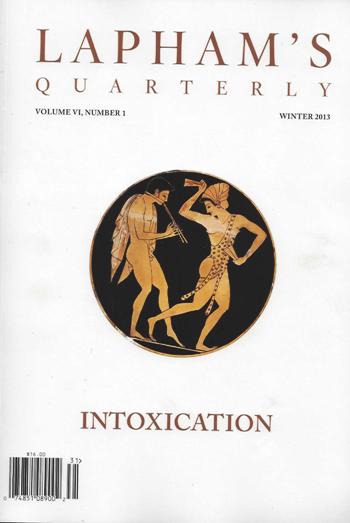 Ghiền
Ghiền
[History and
memory] are step-siblings- and thus they hate one another while sharing
just
enough in common to be inseparable. Moreover, they are constrained to
squabble
over a heritage they can neither abandon nor divide.
Memory is
younger and more attractive, much more disposed to seduce and be
seduced-and
therefore she makes many more friends. History is the older sibling:
somewhat
gaunt, plain, and serious, disposed to retreat rather than engage in
idle
chitchat. And therefore she is a political wallflower-a book left on
the
shelf...
To allow
memory to replace history is dangerous. Whereas history, of necessity,
takes
the form of a record, endlessly rewritten and retested against old and
new
evidence, memory is keyed to public, non-scholarly purposes: a theme
park, a
memorial, a museum, a building, a television program, an event, a day,
a flag.
Such mnemonic manifestations of the past are of necessity partial,
brief,
selective; those who arrange them are constrained sooner or later to
tell
partial truths or outright lies-sometimes with the best of intentions,
sometimes not. In either event, they cannot substitute for history.
Thus, the
exhibition at the Holocaust Memorial Museum in Washington does not
record or
serve history. It is selectively appropriated memory, applied to a
laudable
public purpose. We may approve in the abstract, but we should not
delude
ourselves as to the outcome. Without history, memory is open to abuse.
……
One way to
mark the difference between history and memory is to notice that there
is no
verb for history. You know, if someone says, "I'm making history,"
they mean something very special and usually ludicrous. To
"historicize" is a technical term, conventionally restricted to
scholarly
exchange.
By contrast,
"I remember" and "I recall" are perfectly conventional
things to say. This points to a real difference: memory exists in the
first
person. If there isn't a person, there isn't a memory. Whereas history
exists
above all in the second or third person.
I can talk
about your history, but I can only talk about your memory in a very
limited and
usually offensive or absurd sense. And I can talk about their history,
but I
can't really talk about their memory, unless I know them
extraordinarily well
for some reason ... Because memory is in the first person, it can be
constantly
revised, and it becomes more personal with time. Whereas history, at
least in
principle, takes the other direction: as it is revised, it becomes ever
more
open to the perspective of third parties and thereby potentially
universal. A
historian can start with concerns which are immediate and personal-they
perhaps
have to be-and then work away from them. Sublimating his starting
perspective,
he comes up with something altogether different.
Francine
Prose: Last Testaments (điểm The Memory
Chalet, của Tony Judt (The
Penguin Press) và Thinking the Twentieth
Century của Timothy Snyder (The Penguin Press)
Khi mua số báo
Ghiền, trên, Gấu chỉ muốn nhớ lại một thời ghiền của mình. Đâu
ngờ, thật tuyệt.
Bài điểm sách với cái tít thật "hay" Những
Di Chúc Chót, thì lại là để nhìn lại
thế kỷ vừa qua, vai trò của hồi ức và lịch sử, đúng thứ Gấu đang cần,
để viết bên
lề cuốn Bên Thắng Nhục!
Nhưng
cái đoản văn dưới đây, về Nhậu, mới thần sầu, đúng thứ Gấu cần,
thật cần, làm
quà tặng bạn nhậu
Cali Nov
2012 With HA
Anh
Môn

Rượu thì
cũng giống như Êu. Nụ hôn đầu thần sầu, nụ thứ nhì thân sâu, nụ thứ ba
chuyện
thường ngày ở huyện. Sau đó, thì bạn lột trần [truồng] em ra và... phán!
|
|

